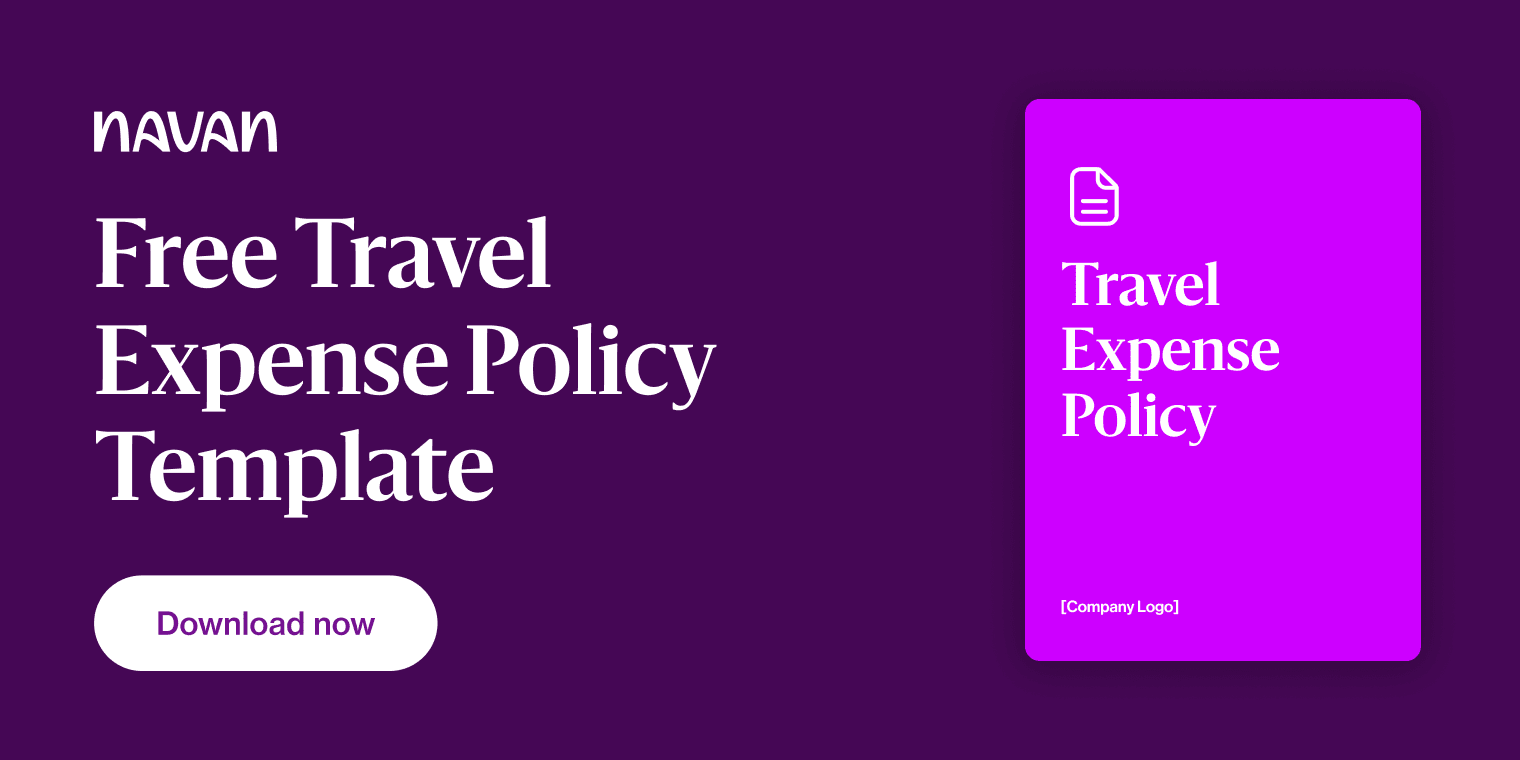Travel Expense Management: How to Keep Corporate Travel Budgets in Check

Samantha Shankman

As corporate travel rebounds to pre-pandemic levels and beyond, managing travel expenses has never been more critical — or complex. According to Navan’s 2024 Insight Report, travel booking volumes in 2024 have surged 18% above 2019, while base airfare prices have climbed by the same percentage. Combined with a 25% rise in taxes and fees, business travel costs continue escalating, putting pressure on companies to control budgets without sacrificing efficiency.
Evolving travel patterns compound this challenge. Shorter booking windows are now standard, with many employees finalizing itineraries just days before departure. At the same time, the rise of “bleisure” trips — nearly four times as popular in 2024 compared to last year — has blurred the line between business and leisure expenses, increasing the need for streamlined systems that help ensure clarity and compliance.
The good news? Modern travel expense management tools are rising to meet these demands.
By centralizing travel arrangements, enforcing policy compliance, and leveraging real-time data, companies can maintain control over costs while enhancing the travel experience for their employees.
This article explores actionable strategies to help businesses navigate these shifts and keep corporate travel budgets on track.
The Importance of Centralized Travel Solutions
A centralized corporate travel management system can transform a chaotic expense process into an efficient one. By consolidating bookings for flights, accommodations, and car rentals into one platform, businesses can streamline operations and minimize errors.
Benefits of a Centralized Travel Platform
- Unified booking system: Manage all travel arrangements from a single interface.
- Improved productivity: Employees spend less time searching for travel options and more time focusing on work.
- Reduced errors: A centralized system minimizes mistakes caused by fragmented tools or manual processes.
Learn how Navan travel management software simplifies travel bookings and expense tracking.
Cost Savings Through Negotiated Rates
Corporate travel platforms often secure exclusive rates through partnerships with airlines, hotel chains, and car rental companies. These negotiated rates, which are typically unavailable to individual travelers, can offer businesses significant savings.
Cost-Saving Features
- Exclusive discounts: Access lower prices on flights, hotels, and transportation.
- Value-added perks: Enjoy upgrades and benefits, such as extra baggage allowances.
- Global inventory access: A vast network helps ensure the best rates are always available.
Enforcing Policy Compliance to Prevent Overspending
Travel policy compliance is a cornerstone of effective budget management. Automated systems can help, by guiding employees toward cost-effective, in-policy options while preventing unauthorized bookings.
Tools for Compliance
- Automated restrictions: Out-of-policy bookings are flagged or blocked in real time.
- Incentives for compliance: Reward programs motivate employees to choose budget-friendly options.
- Transparent policy enforcement: Employees see approved options highlighted during the booking process.
Real-Time Expense Tracking for Greater Budget Control
Real-time tracking of travel expenses offers unparalleled visibility that empowers finance teams to monitor budgets, identify overspending, and make data-driven decisions.
Advantages of Real-Time Tracking
- Accurate budget forecasting: Up-to-date insights help refine financial planning.
- Automated expense reporting: Manual errors are reduced, and employees save time.
- Seamless integration: Travel expenses sync directly with accounting systems.
Enhancing Employee Experience with Advanced Features
Efficient travel management systems benefit businesses and improve employees’ experiences. Features such as pre-loaded traveler profiles and 24/7 customer support help ensure stress-free trips.
Employee-Centric Features
- Quick bookings: Personal preferences are stored for faster arrangements.
- Proactive support: Real-time alerts and instant rebooking options minimize disruptions.
- Streamlined reimbursements: Faster approvals reduce financial stress for employees.
Learn how U.S. digital marketing agency Tinuiti elevated its employees’ travel experience while streamlining reporting and saving money with Navan. Read the complete case study here.
Leveraging Dynamic Pricing for Real-Time Savings
Dynamic pricing tools have become essential for businesses seeking to reduce costs due to rising airfare and accommodation rates. By monitoring market trends and adjusting rates in real time, these tools help companies secure the best deals on travel expenses.
Key Benefits:
- Real-time cost optimization: Secure lower prices for last-minute bookings.
- Increased savings: Identify off-peak travel opportunities to reduce costs.
- Vendor negotiation insights: Use data-driven insights to negotiate better rates with suppliers.
Explore the 5 secrets to better business travel management.
Incentivize Cost-Conscious Behavior Among Employees
Creating a culture of cost-conscious travel can significantly influence a company’s bottom line. By aligning employee choices with budget-friendly practices, businesses can reduce unnecessary spending while maintaining a positive travel experience.
Strategies for Encouragement:
- Reward programs: Offer incentives for employees who select in-policy and cost-saving options.
- Transparent expense policies: Educate employees on allowable expenses and cost-saving alternatives.
- Gamified savings: Introduce leaderboards or challenges to encourage fiscal responsibility.
Learn how Navan’s rewards programs drive cost-conscious travel behavior.
Incorporating Sustainability Into Travel Programs
With an increasing emphasis on sustainability, businesses can get on board by integrating eco-friendly practices into their travel programs. This aligns with corporate social responsibility goals and appeals to employees who prioritize environmentally responsible practices.
Sustainability Strategies:
- Shift to rail travel: Encourage rail over air for short-distance trips, particularly in regions like Europe.
- Carbon tracking tools: Monitor and offset emissions through travel platforms that offer integrated sustainability features.
- Preferred suppliers: Partner with airlines and hotels that demonstrate a commitment to sustainability.
Key finding from Navan’s Insight Report: Rail bookings, as a percentage of Navan’s mean travel booking mix, have increased — from 1% in 2019 to 6% in 2024 — signaling a significant shift toward more sustainable travel options.
Streamlining Bleisure Travel Management
With the rise of bleisure travel, companies must create clear policies and tools that enable employees to combine business and leisure while keeping personal expenses separate seamlessly.
Tools and Tactics:
- Integrated booking systems: Use platforms that allow employees to extend their stays without blending business and personal costs.
- Transparent policies: Outline clear guidelines for bleisure extensions to prevent expense report errors.
Leveraging Travel Data for Strategic Decision-Making
Data is a powerful tool for optimizing travel programs. By analyzing trends and spending patterns, businesses can make informed decisions that enhance cost efficiency and traveler satisfaction.
Data-Driven Benefits:
- Improved budget planning: Use data to identify cost-saving opportunities and allocate resources effectively.
- Travel pattern insights: To refine travel policies and understand where and how employees travel.
- Supplier negotiations: Leverage historical data to secure better terms with travel vendors.
5 Challenges and Solutions in Managing Corporate Travel Budgets
Effective travel expense management often feels like solving a complex puzzle. Businesses face various challenges when managing travel budgets, but the right strategies and tools can help mitigate these issues.
Here are some of the most common obstacles — and how to overcome them:
Challenge 1: Rising Travel Costs
With airfare prices up 18% and taxes and fees climbing 25% since 2019, rising costs are a primary concern for businesses. These increases can quickly strain budgets, especially for companies with frequent travel needs.
Solution:
- Leverage negotiated rates through centralized travel management platforms to secure exclusive discounts on flights, hotels, and car rentals.
- Take advantage of dynamic pricing tools to capitalize on real-time cost optimization and off-peak travel opportunities.
- Encourage cost-conscious behavior among employees with reward programs that promote budget-friendly options.
Challenge 2: Blurred Boundaries Between Business and Personal Travel
The rise of bleisure travel has made distinguishing between business and personal expenses harder, increasing the risk of non-compliant or out-of-policy spending.
Solution:
- Implement booking systems that keep personal and corporate expenses separate.
- Use automated expense tracking tools to flag out-of-policy costs and help ensure compliance.
- Create clear policies for bleisure travel, including allowable personal extensions and expense reporting guidelines.
Challenge 3: Last-Minute Bookings
Shorter booking windows — now a more common practice — can lead to higher costs and logistical inefficiencies, particularly for international or long-haul trips.
Solution:
- Select a travel solution with real-time booking capabilities and dynamic pricing to secure the best available rates, even on short notice.
- Encourage proactive trip planning with pre-approval workflows that streamline the booking process while maintaining flexibility.
- Analyze booking trends using travel data to anticipate and prepare for high-demand periods.
Challenge 4: Lack of Visibility into Spending
With a clear view of travel expenses in real time, businesses can monitor budgets, identify overspending, and make informed decisions.
Solution:
- Adopt real-time expense tracking tools to gain complete visibility into spending as it happens.
- Use integrated travel and expense platforms to centralize all spending data in one place, improving accuracy and accessibility.
- Leverage dashboards and analytics to identify trends, forecast budgets, and negotiate better supplier terms.
Challenge 5: Employee Non-Compliance
Non-compliant bookings can inflate costs and create administrative headaches, especially when employees are unaware of or ignore travel policies.
Solution:
- Use automated policy enforcement tools that guide employees to in-policy options and restrict out-of-policy bookings.
- Incentivize compliance with gamified savings programs or rewards for employees who choose cost-effective travel options.
- Regularly update and communicate travel policies to help ensure employees understand expectations and compliance requirements.
By addressing these challenges with targeted solutions, businesses can create a more efficient, cost-effective travel program that benefits the organization and its employees. These strategies help keep budgets in check and improve the overall travel experience.
Take Control of Travel Expenses Today
Implementing a modern travel expense management system is a strategic investment that delivers significant cost savings, operational efficiency, and employee satisfaction. Businesses can manage their travel budgets by centralizing travel arrangements, leveraging negotiated rates, and enforcing policy compliance while staying agile in a competitive market.
Ready to simplify your corporate travel management? Schedule a demo with Navan to see how we can help.
This content is for informational purposes only. It doesn't necessarily reflect the views of Navan and should not be construed as legal, tax, benefits, financial, accounting, or other advice. If you need specific advice for your business, please consult with an expert, as rules and regulations change regularly.
More content you might like
Take Travel and Expense Further with Navan
Move faster, stay compliant, and save smarter.

